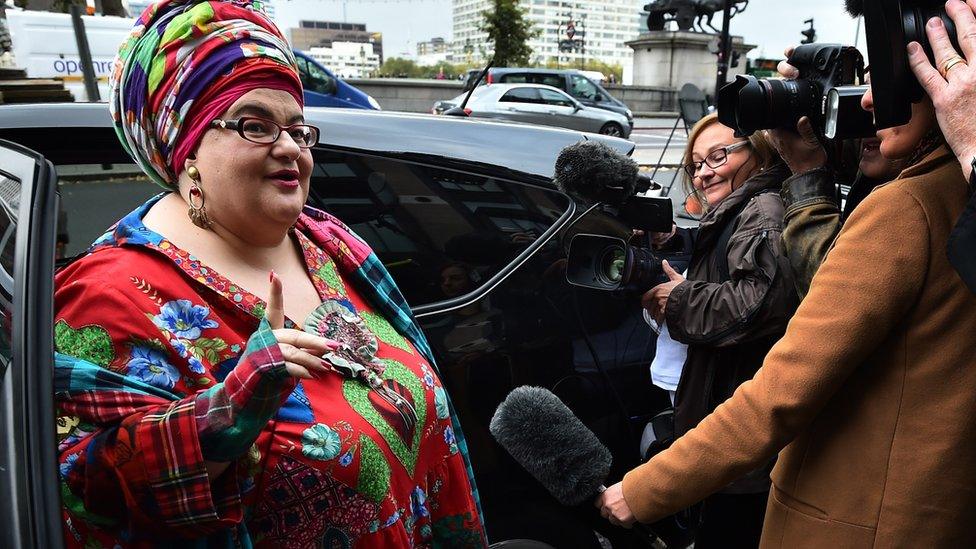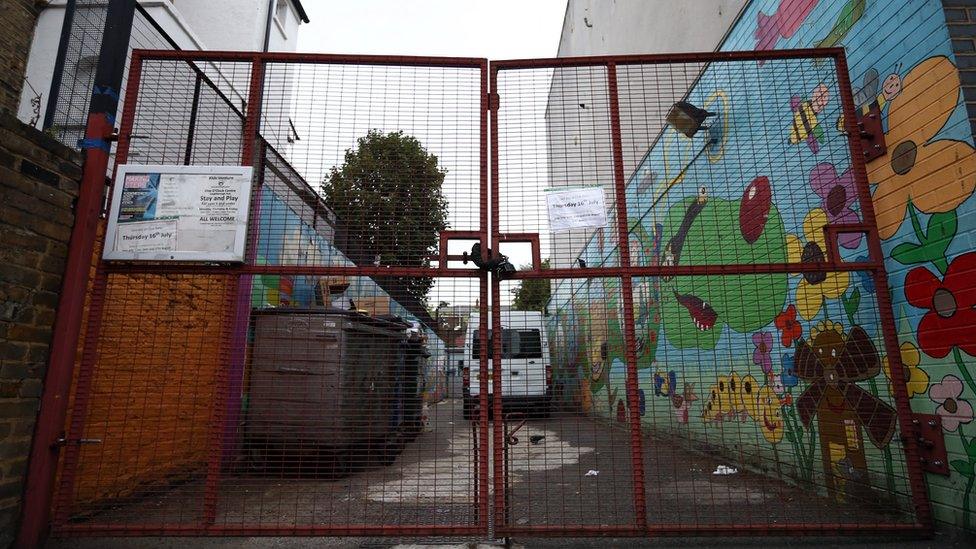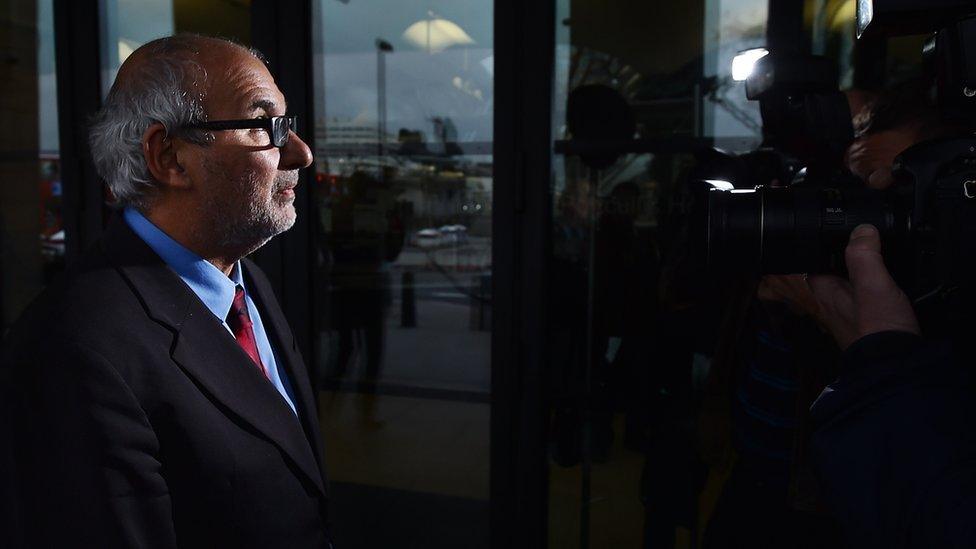MPs pass grim verdict on Kids Company trustees
- Published

Camila Batmanghelidjh arriving to give evidence to MPs last October
A committee of MPs has judged that the oversight of Kids Company, the collapsed south London youth charity, was weak enough that the Charity Commission should consider whether it should bar its trustees from leading other charities in future.
Bernard Jenkin, chairman of the House of Commons Public Administration committee, says the Kids Company saga is a tale of "an extraordinary catalogue of failures of governance and control at every level: trustees, auditors, inspectors, regulators and government".
While Camila Batmanghelidjh, the former chief executive, is criticised in a new report by the committee, MPs have aimed their fire on the trustees to whom she was supposed to answer.
Alan Yentob, a long-serving chairman of the trustees and former BBC creative director, receives particular scorn.
In a statement, the former trustees have stated that, were it not for the parliamentary privilege enjoyed by MPs, defamation claims "would inevitably follow" in response to the remarkably damning verdicts that the report delivers.
They also say that this is an inappropriate message to publish in the midst of a Charity Commission investigation, and say their evidence has been ignored.
'Emotional authenticity'
Many of the MPs' conclusions will be familiar to people who followed the Newsnight-BuzzFeed News investigation into Kids Company - or the work done by Radio 4, the Spectator, external and the Mail on Sunday, external.
It struggled with its finances. Its client numbers made little sense. Favourite clients enjoyed extravagant support. There were safeguarding concerns.
But there is much worth picking out.
For example, in November 2014, Ms Batmangheilidjh turned away a donor who wanted to give significant support "to develop the charity's infrastructure".
At that time, when the charity had a £4m deficit, she decided that this potential donor lacked "emotional authenticity", was not "in a space" where they could "authentically think about what somebody else needs" and was "not ready to be genuinely philanthropic".
Ms Batmangheilidjh had no such qualms about taking money from government. The committee is scathing about how political pressure seemed to override any concerns about whether spending on Kids Company represented a good use of more than £40m. They have called for a change to how grants are administered.
The Cabinet Office has broadly accepted this point, but Oliver Letwin, the minister who overruled Civil Service advice to give Kids Company a £3m bailout just days before it closed, is not repentant.
He said: "As I said to the committee, I believed it was the right thing to do to give this charity one last chance to restructure."

For the trustees, the report makes some very grating comments about safeguarding. The trustee's press statement notes - correctly - that the Metropolitan Police last week said it had failed to identify "any failings by the charity in respect of them carrying out their duty to safeguard children or vulnerable adults".
But the MPs' report, based on listening to former staff members and local government officials, paints a very different picture. David Quirke-Thornton, social services director in Southwark, told them that "children's services purposefully seek to achieve a safe distance between vulnerable children and young people and adults" but "boundaries appeared to have become blurred" at Kids Company.
One worker reported "inappropriate relationships between key workers and clients" due to "untrained key workers [having] no idea about boundaries". Another referred to "two very serious incidents of unprofessional clinical and safeguarding practice in the past three years".
Whistle-blowing
The committee was alarmed by the charity's whistle-blowing procedures: it cites the case of an employee who witnessed a Kids Company therapist supplying a class A drug to a client in the toilets of a Brixton nightclub. As a first response, the MPs report, the whistleblower was told to "confront" the therapist by Ms Batmangheilidjh.
Its conclusion on safeguarding is stark. Citing "a number of safeguarding issues which have come to [the committee's] attention during the conduct of this inquiry into Kids Company", the MPs suggest that the whole sector might need new rules.
Kids Company as a whole was not supervised by Ofsted, the Care Quality Commission nor local government. "There is… a strong case for statutory regulation of charities who have safeguarding responsibilities for children or vulnerable adults", the MPs recommend.

Alan Yentob arrives to give evidence to MPs last October
MPs note that the charity closed in the wake of the announcement of a police investigation into the charity - one sparked by interviews conducted by Newsnight and BuzzFeed News.
That police investigation was actually wound down last week. After a six-month investigation, Scotland Yard could not establish the evidence required to bring criminal charges.
Some sympathetic to the charity argue it might still be open but for those whistleblower reports. Perhaps. But other problems were already emerging and the Charity Commission was already investigating the finances of the charity when it collapsed.
Stories of excess were already bleeding out and even the government was toughening its line. We may learn about these issues from a BBC documentary airing on Wednesday.
Furthermore, as the report notes, "if the trustees had not allowed the charity's weak financial position to persist for so long, Kids Company would not have been so vulnerable to the impact of the allegations". So ultimately, the MPs say, the trustees' failure to keep it in a fit state is why it collapsed.
That's just one criticism that is made of them on a host of issues. On safeguarding, the trustees' failure to have "appropriate processes for handling allegations" was "a serious failure". They were alarmed by "a lack of relevant trustee expertise in the field of youth services or psychotherapy".
'MPs naive'
On money, the "trustees repeatedly ignored auditors' clear warnings about Kids Company's precarious finances". The trustees failed to rein in Ms Batmangheilidjh. The case of the donor turned away in 2014 illustrated "how unaccountable and dominant trustees had allowed her to become, and how far she was able to insist on maintaining personal control".
Mr Yentob attracts particular personal criticism - as does the BBC. The MPs state that he should not have attempted to affect the reporting of BBC journalists who were looking into this saga - and the BBC should have responded more robustly to his attempts to do so.
In response, the BBC says BBC News had concluded that Mr Yentob did not influence its journalism on the reporting of Kids Company.
The trustees say MPs have "naively accepted allegations made in the media and by a small number of individuals, some with vested interests in damaging Kids Company".
But it is hard to escape the conclusion that had Mr Yentob not already resigned as BBC creative director over Kids Company, this parliamentary report would have forced him to do so.